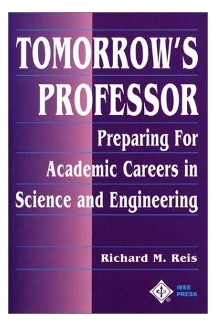XRDS: Resources for Students
The Academic Job Search:
How to Prepare Key Documents
By Matt Might
The academic job search lasts about nine months—after years of preparation! It’s a grueling process, and the chances for failure are high.
Before setting out on an academic job search, it’s crucial that you prepare a number of key documents that will help you sell yourself as a candidate and future faculty member. This checklist and related advice can help you prepare the right application materials.
1. Cover letter, CV, research statement, teaching statement.
I call these the primary documents.  The book Tomorrow’s Professor has great advice on how to make these documents shine. Create both HTML and PDF versions of these primary documents. In the cover letter, use bold face on the names of faculty member. Keep your cover letter very brief—two paragraphs at most. Have local faculty outside your area read over your materials, and most important of all, listen to their feedback. List impact factors or acceptance rates alongside your publications in your CV. This gives people outside your field a crude metric to judge your publications.
The book Tomorrow’s Professor has great advice on how to make these documents shine. Create both HTML and PDF versions of these primary documents. In the cover letter, use bold face on the names of faculty member. Keep your cover letter very brief—two paragraphs at most. Have local faculty outside your area read over your materials, and most important of all, listen to their feedback. List impact factors or acceptance rates alongside your publications in your CV. This gives people outside your field a crude metric to judge your publications.
2. Social media profiles.
Employers likely will search for your name, and they do anticipate you’ll have a Facebook page, LinkedIn account, and so forth. It’s okay to have online profiles, but clean up your image and politically sterilize them before your job search even begins.
3. Web site.
You’ll need a straightforward and professional web site to host your primary documents and all your published works or links to them if they are restricted.
While I was searching for a job, I tracked my web site’s traffic and found that 69 percent of visitors originating from academic institutions hit my homepage, whereas only 18 percent looked at my CV. Ten percent got to my research statement, while only 3 percent hit my teaching statement. The take-away? Your homepage is more important than even your CV.
It’s also helpful to know that interviewers will usually wait until the last minute to download and print paper copies of your materials, perhaps the same day you arrive for an interview. Keep everything current.
Once these application materials land you a few interviews, you’ll still have to prepare a job talk, your answers to the standard questions that come up during the typical academic job interview, and your approach to negotiating and discussing start-up packages.
Additional Resources
"Giving a Job Talk in the Sciences," by Richard M. Reis, The Chronicle of Higher Education (2001)
Even a Geek Can Speak by Joey Asher (2006, second edition)
Tomorrow's Professor: Preparing for Academic Careers in Science and Engineering by Richard M. Reis (1997, Wiley-IEEE Press)

